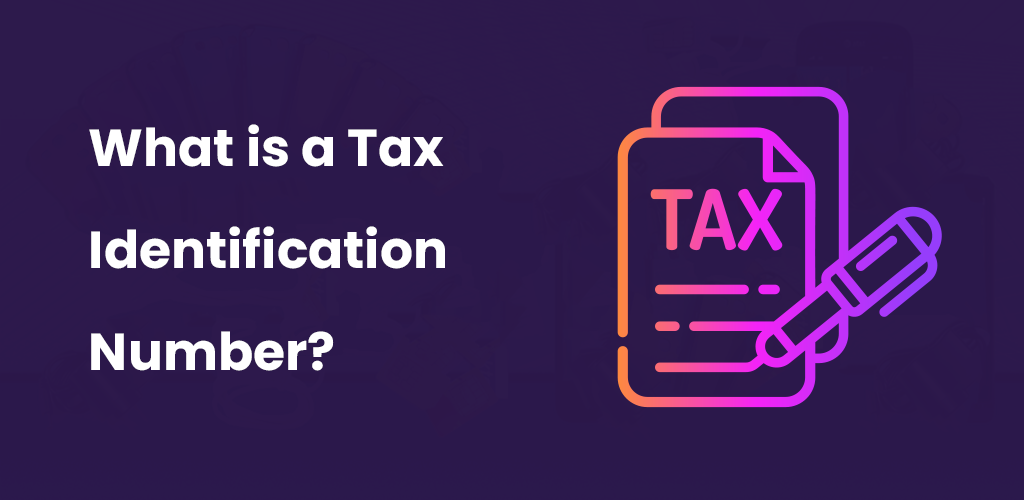What is a Tax Identification Number (TIN)?
Have you been asked for a Tax Identification Number, and you’re not sure what it is, or where to find it? Today we’re continuing our series of blog posts that look at some of the biggest concerns for small businesses, and since we’re all obligated to pay taxes as we earn money, we’re talking about Tax Identification Numbers (TINs).
Before we get going, we need to point out that although we’re experienced in business, we are not tax professionals. While we’ve provided information here that we know to be accurate to date, and we will endeavour to update the post when things change, you should always do due diligence and ensure what we have here is in line with current rules and regulations. It is a good idea to check with your accountant or tax professional to ensure your tax information is correct, and check with HMRC if you are unsure whether you have the right number to file your taxes.
What is a Tax Identification Number?
A Tax Identification Number is exactly what it sounds like – it is a number that identifies an individual for tax purposes. The term Tax Identification Number is an umbrella term that covers all types of numbers that can be used when contacting official bodies for tax reasons. Tax Identification Numbers are used by most countries worldwide, to help identify tax paying individuals, to help with administering tax and to identify companies that need to pay taxes.
Types of Tax Identification Numbers
Although Tax Identification Numbers are used by most countries, they are different in each. Some countries use social security numbers, numbers from identity cards or passports or other national numbers. If you’re working in other countries and need to know what they use as TINs, you can find a list of types of Tax Identification Numbers or functional equivalents on this page.
In this next section, we’re going to take a look at the UK (since the Avasam team is primarily based in the UK) and the US (because it is one of the biggest and most influential economies in the world).
In the UK
In the UK, Her Majesty’s Revenue and Customs (HMRC) creates Tax Identification Numbers, and there are two numbers that are most commonly used to identify individuals and businesses. These are the Unique Taxpayer Reference (the UTR) and the National Insurance Number (NI number). Both of these numbers are personal, and private to the individual they have been allocated to (and should be treated in the same way as any other personal information such as addresses or date of birth). Once allocated, they do not change throughout the person’s life. They are always laid out in the same format.
Unique Taxpayer Reference (UTR)
The Unique Taxpayer Reference (UTR) is automatically assigned to individuals when they do one of two things with HMRC – either when they register for Self Assessment, or when setting up a limited company. It is made up of 10 digits, and is sometimes referred to as a tax reference.
There isn’t an official card or other type of document with the details of the UTR issued, so you’ll need to find your UTR on any documents from HMRC such as:
- Your SA250 letter entitled Welcome to Self Assessment
- Your Self Assessment tax return paperwork
- Your notice to file a tax return
- Your statement of account
- Any payment reminders you get
To get a UTR number, you’ll need to go through registering for Self Assessment online. Typically, you will need:
- Your name, date of birth and address
- Your National Insurance number
- Your email address and telephone number
- The name, address and nature of your business
- Your business telephone number
- The date your self-employment started
Note that when you register for Self Assessment, it can be a few weeks (if not longer, during busy periods!) before you receive your Unique Taxpayer Reference, so don’t leave registration to the last minute – especially if you need to file a tax return before the deadline. (If you miss the deadline, fines can get expensive!)
If you have registered for Self Assessment, you can also find your Unique Taxpayer Reference in your Personal Tax Account. If you don’t have access, or can’t find a UTR on any of your documentation, you can call the Self Assessment helpline.
National Insurance Number (NI number)
The second type of Tax Identification Number that is used in the UK is the National Insurance Number (sometimes referred to as a NI number). It is made up of two letters, six numbers and a suffix letter A, B, C or D.
National Insurance Numbers are issued either by the Department for Work and Pensions or HM Revenue and Customs, and are issued automatically when young people reach the age of 16. A letter, and sometimes a card will be sent to the individual, but these cannot be used as proof of identity.
People who don’t have a National Insurance number will need to apply for one if they plan to work, claim benefits, apply for a student loan or to pay Class 3 voluntary National Insurance contributions.
When payslips are received from an individual’s employer, the National Insurance Number should be shown, and it should also be found on a Statement of Account issued by HMRC. The National Insurance Number is sometimes used on official documents from HMRC, but may not be for certain documents.
What if I don’t have either of these?
Not all resident taxpayers or nationals will have either of these, and sometimes they may receive a PAYE Temporary Reference Number (TRN) which is used when an individual’s National Insurance Number can’t be found or held. This number is made up of two numbers, one letter, then five numbers. </p?
Do companies get a Tax Identification Number?
Companies have Unique Taxpayer References, and are also issued with a Corporation Tax number upon registering their company with Companies House. Don’t get your Company UTR mixed up with your Company Registration Number (CRN) though. The CRN is issued when your company is incorporated (that is, it becomes its own legal entity). A CRN is a combination of 8 alpha-numeric characters, and are used to identify your company (since companies with similar names exist) and to verify incorporation with Companies House.
In the US
In the US, the Tax Identification Number (TIN) is issued by the federal government and is used by individuals and companies for tax purposes, which is overseen by the Internal Revenue Service (IRS). TINs are allocated to individuals by the Social Security Administration, and the IRS issues TINs to companies.
There are a number of Tax Identification Numbers used in the US, including:
- Social Security Numbers – these are allocated to individuals
- Individual Taxpayer Identification Numbers (ITIN) – these are allocated to any citizens that currently live (and/or work) in the US but that are not US citizens
- Employer Identification Number (EIN) – these are used to identify businesses and non-profit organizations
- Adoption Taxpayer Identification Number (ATIN) – which are used to identify children that are currently in the process of being adopted from outside the US
- Preparer Taxpayer Identification Number – this is how accountants and tax professionals who prepare tax documentation are identified
Some states have separate business identification numbers or other requirements that must be used in addition to those issued by the IRS. These states are currently Massachusetts, New York and South Carolina. In these states, every business needs a state tax ID number and a federal tax ID number.
Do I need a TIN for my DropShipping business?
All businesses will need to pay tax, and the type of business that you have, and where your business operates will depend on the type of tax that you pay, and may affect the type of Tax Identification Number that you will need. If you’re in the UK, you’ll have a UTR for yourself, and for your business. We took a look at some of the required steps for setting up a business previously in this post, so if you are in the process of getting set up we strongly recommend checking that post.
As we noted at the start of the post, it is always a good idea to consult with an accountant or tax professional, or contact the body that collects taxes in the country that your business operates in if you are unsure.
The Tax Identification Number is a pretty straightforward thing to understand – it is just a number that identifies an individual or business for tax purposes. They’re different in each country, and so you’ll need to know what type of TIN is used in the country that you need to pay taxes. In the UK, all individuals receive a National Insurance number, while anyone who has a business or needs to complete Self Assessment will need a UTR.
Just to reiterate: As we said at the start of this post, the team at Avasam is made up of professionals with decades of experience in business, but we’re not tax professionals. If you have any doubt about your Tax Identification Number, the taxes that your company is liable for or how much you are likely to pay, contact your accountant or tax professional.




DropShip products from verified suppliers to diversify your inventory and scale your eCommerce business